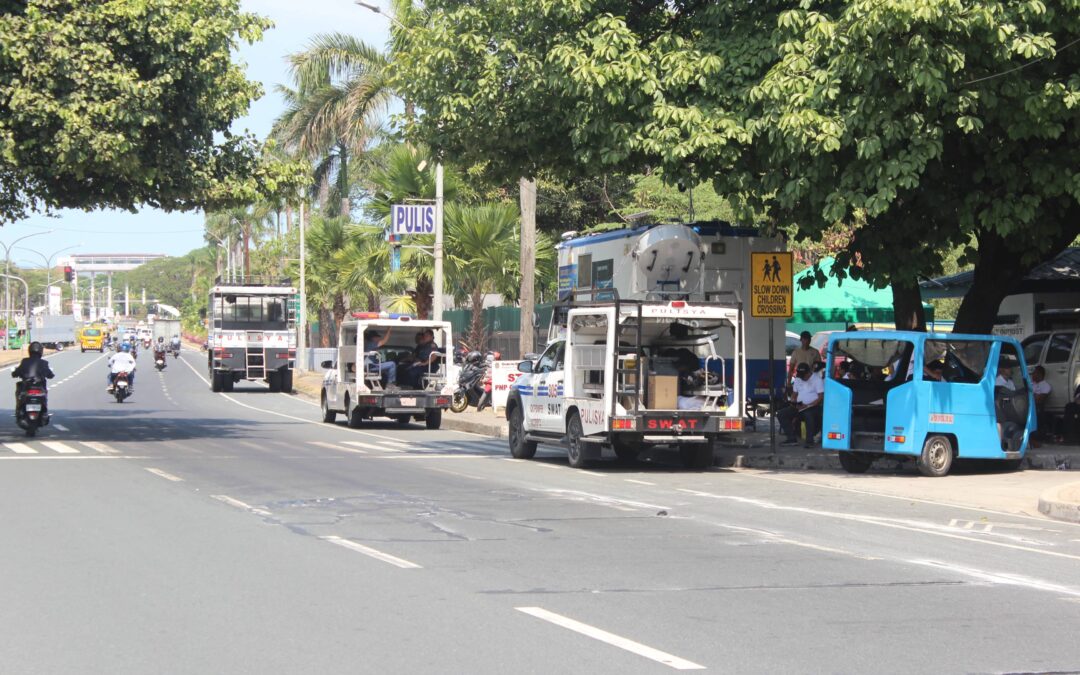Several groups have raised concerns over the presence of policemen at the University of the Philippines (UP) Diliman on Monday, April 29, coinciding with the first day of the three-day nationwide transport strike organized by the transport group Piston.
The mobilization at UP Diliman, joined by Piston and other groups, aimed to protest against the franchise consolidation under the government’s public utility vehicle (PUV) modernization program.
President Ferdinand Marcos Jr. has reiterated his decision not to extend the deadline set on Tuesday, April 30.
UP Faculty Regent Carl Marc Ramota called out the police intrusion, stressing that such actions constitute a violation of the University’s institutional autonomy and established protocols governing police operations within campus premises.
“This a clear violation of the institutional autonomy of the [University] and existing protocols on the conduct of police and military operations in campuses. We call on the UP Diliman administration and the Quezon City government to… probe possible lapses in protocols,” Ramota said.
The UP Diliman University Student Council (USC) condemned the police intrusion and reported instances where police officers allegedly approached students to inquire about personal information.
“Sa unang araw ng strike, nakita natin ang daan-daang [pulis] na humarang sa mga entry points ng UP Diliman para pigilan ang mga tsuper na lumabas. Nanghimasok ang ilan sa kanila at lumapit sa ibang mga mag-aaral upang tanungin ang kanilang mga pangalan at iba pang impormasyon,” the USC said.
(On the first day of the strike, we saw hundreds of police blocking the entry points of UP Diliman to prevent drivers from leaving. Some of them intruded and approached other students to ask for their names and other information.)
“Mahalagang [aspekto] sa ating kalayaang pang-akademiko ang pagtutol sa panghihimasok ng [pulisya] at militar sa loob ng pamantasan,” it said.
(Opposing the intrusion of police and military inside the university is an important aspect of our academic freedom.)
“Nananawagan kami sa UP Administration na sumandig sa interes ng mga tsuper at miyembro ng UP community at huwag nang hayaan ang panghihimasok ng [pulisya] sa UP. Ang [pagsuong] kanina ng sangkaestudyantehan sa init upang tutulan ang presensiya [ng] pulis sa pamantasan ay patunay na ang pagtindig ng kabataan ay sa interes ng masa,” it added.
(We call on the UP Administration to align with the interests of the drivers and members of the UP community and to not allow police intrusion into UP. The student body’s protest earlier in the heat to oppose the presence of police in the university is evidence that the youth’s stance is in the interest of the masses.)
“Inaanyayahan namin ang lahat ng ituloy ang pakikiisa sa mga tsuper at operator at paggiit ng kalayaang pang-akademiko.”
(We invite everyone to continue to unite with the drivers and operators and to assert academic freedom.)
The All UP Academic Employees Union (AUPAEU) Diliman Chapter also denounced the presence of the Philippine National Police (PNP) inside the campus.
“Makatarungan ang tigil-pasada at mobilisasyon ng mga tsuper at komunidad. Kinokondena ng AUPAEU Diliman ang pagpapalibot ng PNP sa ating campus ngayong araw ng transport strike laban sa PUV phaseout at bílang paghahanda sa malaking pagkilos sa Mayo 1,” AUPAEU Diliman said.
(The transport strike and mobilization are just. The AUPAEU Diliman condemns the deployment of the PNP on our campus today during the transport strike against the PUV phaseout and in preparation for the large-scale mobilization on May 1.)
“Ang malaking bulto ng [pulisya] ay ‘di umano’y nakapuwesto para pigilang ilunsad ng mga tsuper at nagkakaisang sektor ang kanilang mobilisasyon patungong Maynila dahil makakadulot daw ito ng matinding trapiko,” the union added.
(The majority of the police were allegedly stationed to prevent the launch of the drivers and the united sector’s mobilization towards Manila, citing potential severe traffic congestion.)
“Walang wastong dahilan ang PNP at estado [na] pigilan ang protesta ng mamamayan laban sa PUV phaseout [at] supilin ang ating mga karapatang kumilos, magpahayag, at magtuligsa sa estado.”
(There is no valid reason for the PNP and the state to hinder the people’s protest against the PUV phaseout, and suppress our rights to act, express, and criticize the government.)
UP Diliman Chancellor Edgardo Carlo Vistan II confirmed that while the PNP’s Quezon City Police District (QCPD) had coordinated with the University administration, their intrusion onto campus was not permitted.
“Kinausap naman táyo ng QCPD na magkakaroon sila ng operation. Aantabayanan nila iyong mangyayari dahil nga sa welga ngayon, kasi nagkaroon sila ng ‘di magandang experience noong huling nanggaling iyong motorcade dito sa loob ng ating campus,” Vistan told DZUP.
(The QCPD did advise us about conducting an operation. They said they will monitor what will happen today, because they had a bad experience when protesters started their motorcade on our campus last time.)
“Pero, wala naman silang pinaálam [na pumasok] at hindi naman táyo papayag na papasok sila sa campus. Ang talagang sinabi lang nila sa Commonwealth sila mag-aantabay kasi considering iyong nangyari noong panahong iyon, na nakakapagpalala ng traffic,” he explained.
(But they did not inform us about entering, and we would not have allowed them to enter the campus anyway. They just said they would wait along Commonwealth Avenue because considering what happened last time, it worsened the traffic.)
“Ngayon, wala namang usapan na papások sa [loob ng campus]. Walang coordination para pumasok [sila] sa campus at hindi naman táyo papayag kung gano’n,” the Chancellor added.
(Now, there was no agreement for them to enter the campus. There was no coordination for them to enter the campus, and we would not allow that anyway.)
“So, noong nalaman natin na may nakapasok sa [loob ng campus]. Tinawagan ko kaagad iyong kanilang hepe para hingin iyong report nila at ipalabas iyong mga nakapasok at lumabas din naman iyong mga nakitang pumasok.”
(So, when we found out that some police officers had entered the campus, I immediately called their chief to request their report. I told him that they should not be on campus. Eventually, those who entered left campus grounds.)
In response, QCPD Spokesperson Police Captain Febie Madrid apologized for any inconvenience caused by their presence and clarified the reason for their deployment.
“As a proactive measure, this Police District deployed personnel to assist and ensure public safety and order in the ongoing strike of various transportation groups along Commonwealth Avenue,” Madrid explained.
“Due to extreme hot weather, our personnel [probably sought] shelter under the trees [inside the campus] for a little comfort. [If] the presence of our deployed personnel caused alarm or inconvenience, my apologies,” Madrid said.
“Our Police Station 9 had [previously] coordinated with the [University’s] administration and security management prior to the deployment today.”
In 1992, UP and the Department of the Interior and Local Government (DILG) signed an agreement requiring the PNP to notify the University before conducting operations within its campuses.
This accord remains in effect despite the national government’s unilateral abrogation of a similar agreement with the Department of National Defense in 2021. — with reports from Rex Espiritu and Ivy Montellano

